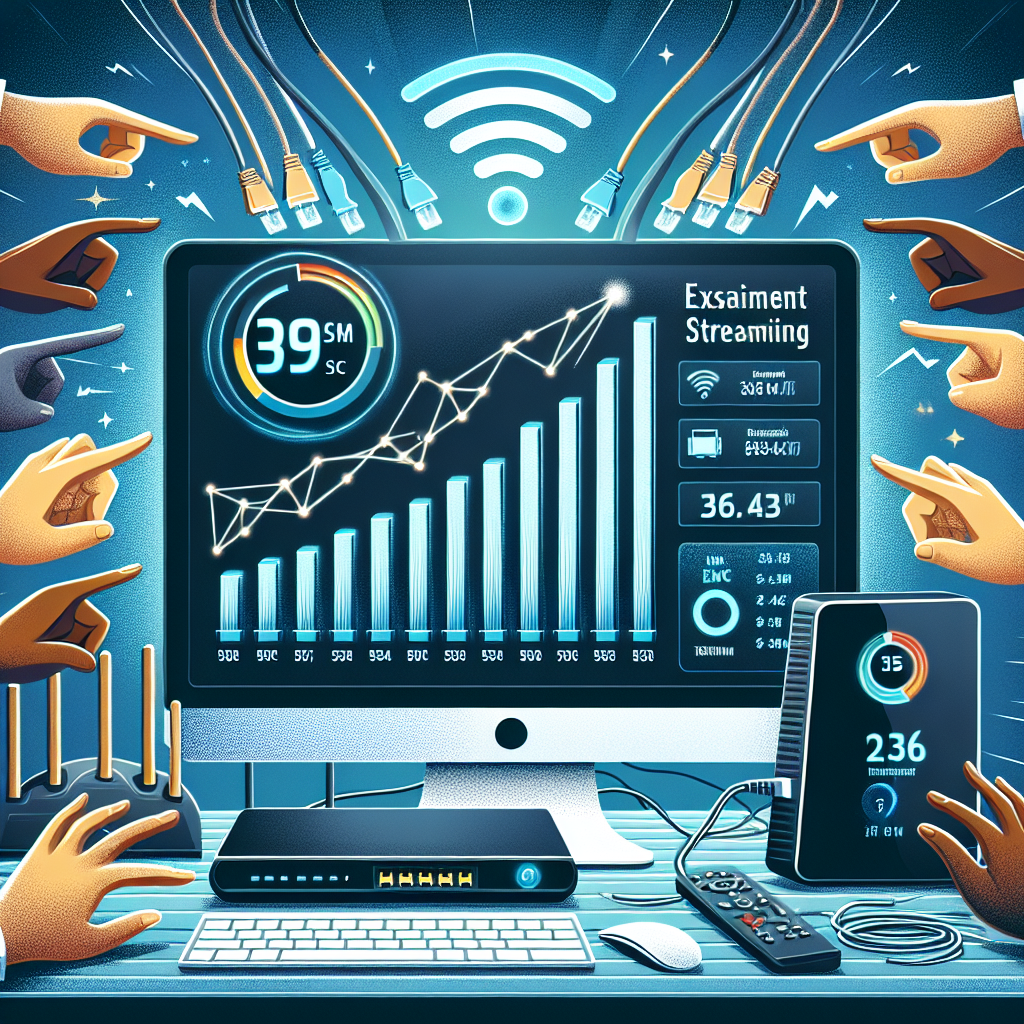In this fast-paced digital age, optimizing your internet connection for streaming is more important than ever. A speed test for streaming is a crucial tool for ensuring that you are getting the most out of your internet performance. By measuring the speed and quality of your connection, you can fine-tune your settings to enjoy seamless streaming of your favorite movies, TV shows, and music. Whether you’re binge-watching the latest series or hosting a virtual movie night, maximizing your internet performance is key to a smooth streaming experience. Stay ahead of the game with a speed test for streaming and take your entertainment to the next level.
Understanding Internet Speed for Streaming

– How internet speed impacts streaming quality
Internet speed plays a crucial role in determining the quality of your streaming experience. The speed of your connection directly influences how quickly data can be downloaded and uploaded, which in turn affects the smoothness and resolution of the videos you are streaming. Higher internet speeds allow for faster loading times, minimal buffering, and sharper image quality, while slower speeds can result in pixelation, pauses, and overall poor streaming performance.
- Bandwidth vs. latency: Key factors in streaming speed
Bandwidth and latency are two primary factors that impact internet speed for streaming. Bandwidth refers to the maximum rate at which data can be transferred over a network connection and is measured in bits per second. The higher the bandwidth, the more data can be transmitted, leading to smoother streaming experiences. On the other hand, latency, often referred to as ping, is the time it takes for a data packet to travel from the source to the destination. Low latency is essential for real-time activities like online gaming and video conferencing, as it minimizes delays and ensures a seamless streaming experience.

Types of Speed Tests
Online Speed Test Tools
Online speed test tools are convenient and efficient ways to assess the performance of your internet connection. These tools are readily available on various websites and can provide valuable insights into your network’s speed capabilities. To conduct an accurate speed test online, consider the following:
- Popular speed test websites
- Ookla’s Speedtest.net: One of the most widely used speed test tools, offering detailed information on download and upload speeds, as well as ping latency.
- Fast.com: A simple and straightforward tool developed by Netflix to specifically measure download speeds.
- Google’s speed test: Google offers its own speed test tool that provides quick insights into your internet connection’s performance.
- How to conduct an accurate speed test online
- Close all unnecessary applications and browser tabs on your device to ensure an accurate measurement.
- Connect your device directly to the modem or router using an Ethernet cable for more precise results.
- Choose a reputable speed test website to avoid inaccurate readings.
- Run the speed test multiple times at different times of the day to get a comprehensive understanding of your internet performance.
By utilizing these online speed test tools effectively, you can optimize your streaming experience by ensuring that your internet connection meets the requirements for seamless playback of high-quality content.
In-Home Speed Test Methods
When it comes to In-Home Speed Test Methods, there are a few options available for users to gauge the performance of their internet connection. These methods can provide valuable insights into the speed and reliability of the network, helping individuals optimize their streaming experience. Here are two popular approaches to conducting in-home speed tests:
- Using built-in router tools: Many modern routers come equipped with built-in tools that allow users to run speed tests directly from the router’s interface. By accessing the router settings through a web browser, individuals can typically find a section dedicated to network diagnostics and performance monitoring. Within this section, there is often an option to initiate a speed test, which will measure the internet speed coming into the home. This method can offer a quick and convenient way to assess the connection speed without the need for additional software or applications.

– Third-party apps for in-home speed testing: Alternatively, individuals can opt to utilize third-party applications specifically designed for conducting speed tests within the home network. These apps are typically available for download on various devices, including smartphones, tablets, and computers. By running these apps on a connected device, users can measure crucial metrics such as download speed, upload speed, and latency. Third-party speed test apps often provide more detailed results and analysis compared to built-in router tools, offering a comprehensive overview of the network performance. Additionally, some apps may offer additional features like historical data tracking and personalized recommendations for improving internet speed and stability.
Interpreting Speed Test Results
Download and Upload Speeds
When it comes to streaming content online, the download and upload speeds of your internet connection play a crucial role in determining the quality of your viewing experience. Here are some key points to consider when interpreting these speed test results:
- Download Speeds: The download speed refers to how quickly data can be transferred from the internet to your device. For streaming, a higher download speed is essential to ensure smooth playback without buffering interruptions.
- Upload Speeds: On the other hand, upload speed indicates how fast data can be sent from your device to the internet. While upload speed is not as critical for streaming as download speed, it is still necessary for activities like video conferencing or live streaming content.
What do these metrics mean for streaming?
For streaming, a higher download speed is more important than upload speed. A fast download speed ensures that the video content can be loaded quickly and played back seamlessly without pauses or quality degradation. Upload speed comes into play when you are actively participating in live streaming or sharing your own content online.
Ideal speeds for HD and 4K streaming
- For HD streaming (1080p): An ideal download speed for HD streaming is around 5-10 Mbps. This will allow you to watch videos in high definition without experiencing buffering issues.
- For 4K streaming: To enjoy 4K content in all its glory, a download speed of at least 25 Mbps or higher is recommended. This ensures that the ultra-high-definition videos can be streamed smoothly without any lag or pixelation.
In conclusion, understanding the significance of download and upload speeds in relation to streaming is essential for optimizing your internet performance and enhancing your viewing experience.
Ping and Jitter Measurements
Ping and jitter are crucial metrics when it comes to assessing the performance of your internet connection, especially for streaming purposes.
- Importance of low ping and jitter for streaming:
Ping refers to the time it takes for a data packet to travel from your device to a server and back. A low ping is essential for streaming as it indicates minimal delay in communication between your device and the server. High ping values can result in buffering, lag, and poor streaming quality. Jitter, on the other hand, measures the variability in ping times. Consistent low jitter is necessary for a smooth streaming experience, as fluctuations in ping can lead to interruptions and stuttering during playback. - Troubleshooting high ping and jitter issues:
If you encounter high ping or jitter during a speed test, there are several steps you can take to address these issues. Start by checking your network connection and ensuring that no other devices are consuming excessive bandwidth. If the problem persists, consider restarting your router or contacting your internet service provider to investigate potential network congestion or technical issues. Additionally, using a wired connection instead of Wi-Fi can help reduce ping and jitter levels for improved streaming performance. Regularly monitoring your ping and jitter values through speed tests can help identify and resolve connectivity issues promptly, ensuring optimal internet performance for streaming activities.
Factors Affecting Streaming Speed
Network Congestion
Network congestion can significantly impact the speed and quality of your streaming experience. During peak hours, when many users are simultaneously accessing the internet, congestion levels tend to rise. This can lead to slower speeds, buffering, and poor video quality while streaming your favorite content.
How peak hours impact streaming performance:
- Increased Latency: Network congestion during peak hours can result in higher latency, causing delays in data transmission. This delay can manifest as buffering or lag when streaming videos.
- Reduced Bandwidth: With more users vying for limited bandwidth during peak hours, each user’s share of the available bandwidth decreases. This reduction in bandwidth can lead to lower streaming speeds and interruptions in the playback of high-definition content.
- Packet Loss: Network congestion can also increase the likelihood of packet loss, where data packets fail to reach their intended destination. This can result in incomplete or distorted video streams.
Strategies to mitigate network congestion:
- Schedule Off-Peak Streaming: To avoid the impact of network congestion, consider streaming during off-peak hours when internet traffic is lighter. This can help improve streaming speeds and reduce the likelihood of buffering.
- Upgrade Your Internet Plan: If you frequently experience network congestion issues, upgrading to a higher-speed internet plan with more bandwidth can provide a more reliable streaming experience, especially during peak hours.
- Optimize Your Home Network: Ensure that your home network is optimized for streaming by using a wired connection, updating your router firmware, and minimizing interference from other devices. This can help improve overall network performance and reduce the impact of congestion on your streaming speeds.
Wi-Fi vs. Wired Connection
actors Affecting Streaming Speed
When considering the optimal setup for streaming, the choice between a Wi-Fi and a wired connection plays a crucial role in determining the speed and quality of your internet performance. Understanding the pros and cons of each option is essential for maximizing your streaming experience.
Pros and Cons of Wi-Fi for Streaming
- Pros:
- Convenience and flexibility in terms of device mobility.
- Easy setup without the need for physical cables.
- Suitable for streaming on devices like smartphones, tablets, and smart TVs.
- Cons:
- Susceptibility to interference from other electronic devices and physical obstacles like walls, which can result in signal degradation.
- Limited bandwidth and potential signal fluctuations, leading to buffering and lower streaming quality.
- Higher latency compared to wired connections, affecting real-time streaming activities like gaming.
Benefits of Using a Wired Connection for Consistent Speed
- Reliable Speed:
- Wired connections offer a more stable and consistent speed compared to Wi-Fi, ensuring smoother streaming with minimal interruptions.
- Reduced latency and packet loss contribute to a seamless streaming experience, especially for high-definition content.
- Improved Security:
- Wired connections are less vulnerable to interference or unauthorized access, enhancing the security of your network and streaming activities.
- Optimal Performance for Bandwidth-Intensive Tasks:
- For bandwidth-heavy tasks such as 4K streaming or online gaming, a wired connection provides the necessary speed and stability to support these activities effectively.
In conclusion, while Wi-Fi offers convenience and flexibility, opting for a wired connection can significantly enhance your internet performance for streaming purposes, ensuring a smoother and more reliable experience overall.
Optimizing Your Streaming Experience
Tips for Speed Test Accuracy
Conducting a speed test is crucial for ensuring optimal performance when streaming online content. To maximize the accuracy of your speed test results, consider the following tips:
- Conducting Multiple Tests for Reliable Results
To obtain a more accurate representation of your internet speed, it is recommended to conduct multiple speed tests at different times of the day. Internet speeds can fluctuate based on various factors such as network congestion, time of day, and the number of devices connected to your network. By running multiple tests, you can identify any inconsistencies and obtain a more reliable average speed.
- Factors to Consider When Choosing a Speed Test Tool
When selecting a speed test tool, it is essential to consider factors that can impact the accuracy of the results. Look for a reputable speed test provider that offers reliable testing servers and a user-friendly interface. Consider whether the speed test tool measures both download and upload speeds, as well as factors such as latency and packet loss. Additionally, ensure that the speed test tool is compatible with your devices and operating system to obtain the most accurate results.
Improving Internet Speed for Streaming
In order to optimize your internet speed for streaming, there are several key strategies you can implement to ensure a seamless viewing experience.
- Upgrade Your Internet Plan: One of the most effective ways to enhance your streaming performance is to consider upgrading your internet plan to a higher speed tier. Higher speed plans typically offer greater bandwidth, which is essential for streaming high-definition content without buffering or interruptions. Contact your internet service provider to inquire about available plans that can better accommodate your streaming needs.
- Check for Bandwidth Limitations: Some internet service providers impose bandwidth limitations, which can significantly impact your streaming quality, especially during peak usage times. Be sure to review your current plan’s bandwidth restrictions and consider upgrading to a plan with higher or unlimited bandwidth to improve your overall streaming experience.
- Reduce Network Congestion: Network congestion can also affect your internet speed and streaming quality. To minimize congestion, ensure that your router is placed in a central location within your home to provide optimal coverage. Additionally, consider limiting the number of devices connected to your network simultaneously, as multiple devices can strain bandwidth and slow down your internet speed.
- Update Your Router Firmware: Outdated router firmware can hinder your internet speed and streaming performance. Regularly check for firmware updates for your router and ensure that it is running the latest version to take advantage of any performance improvements or bug fixes. Updating your router’s firmware can help optimize its settings for streaming and enhance overall internet speed.
By implementing these strategies and optimizing your internet speed for streaming, you can maximize your online viewing experience and enjoy seamless playback of your favorite content without interruptions or delays.
FAQs Speed Test for Streaming: Maximizing Your Internet Performance
What is a speed test for streaming and why is it important?
A speed test for streaming is a tool that measures the speed and quality of your internet connection, specifically in relation to streaming content online. It helps determine whether your internet speed is sufficient for smooth streaming without buffering or lagging. By regularly conducting speed tests, you can ensure that your internet performance is optimized for a seamless streaming experience.
How do I conduct a speed test for streaming?
To conduct a speed test for streaming, simply visit a reputable speed testing website or use a dedicated speed test app. Click on the “Start Test” button to initiate the test, and within a few seconds, you will receive results indicating your internet speed in terms of download and upload speeds, as well as ping latency. These results will help you identify any issues with your internet connection that may affect your streaming quality.
What internet speed is recommended for streaming?
The recommended internet speed for streaming can vary depending on the quality of the content you are streaming. For standard definition (SD) streaming, a minimum internet speed of 3-4 Mbps is recommended. For high definition (HD) streaming, a speed of at least 5-8 Mbps is ideal. For streaming 4K Ultra HD content, a minimum speed of 25 Mbps is recommended. Keep in mind that these are just guidelines and actual speed requirements may vary based on the streaming service and device you are using.
How can I improve my internet speed for streaming?
There are several ways to improve your internet speed for streaming. You can try moving your router to a more central location in your home, reducing the number of devices connected to the network, or upgrading to a higher-speed internet plan from your service provider. Additionally, using a wired Ethernet connection instead of Wi-Fi can potentially improve your streaming speed and reliability. Conducting regular speed tests can also help pinpoint any issues that may be affecting your internet performance.